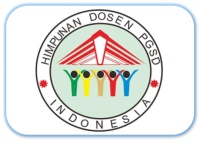Peningkatan Hasil Belajar Tematik Terpadu Menggunakan Model Problem Solving di Kelas IV Sekolah Dasar
Abstract
This study aimed to know the improvement of student’s learning outcomes by using Problem Solving models in the grade fourth of Elementary Schools number 09 Bandar Buat Padang. The type of this study was classroom action research with kuantitative and kualitative approaches. The subjects of this study were the teachers and the students of grade fourth. The result showed: the implementation of lesson plan in cycle I B was good, cycle II SB was very good, because the lesson plan filled the criterias. The assessment of teacher’ aspects in cycle I B was good, cycle II SB was very good, because it applied based on the lesson plan and the steps of Problem Solving models. The assessment of students’ aspects in cycle I B was good, cycle II SB was very good, because it applied based on the lesson plan and the steps of Problem Solving models.The assessment of attitude aspects in cycle I was good, cycle II was very good, because students showed positive attitude based on KI-1 and KI-2. The assessment of knowledge aspects in cycle I was good, cycle II was very good, because students could solve the problem. The assessment of skills aspects in cycle I was good, cycle II was very good, because students could do skills based on categories. In the conclusion, Problem Solving models can improve of student’s learning outcomes in integrated thematic learning.
Keywords
Full Text:
PDFReferences
Afifudin. (2012). Metodologi Penelitian Kualitataif. Bandung: Pustaka Ceria.
Arikunto, dkk. (2015). Penelitian Tindakan Kelas. Jakarta: Bumi Aksara.
Faisal. (2014). Sukses Mengawal Kurikulum 2013 di SD. Yogyakarta: Diandra Creative.
Paggara, H. (2016). Peningkatan Hasil Belajar Matematika Melalui Model Problem Solving Pada Siswa Kelas V SDN Kakatua Kecamatan Mariso Kota makassar. Jurnal Publikasi Pendidikan, Vol. 1, No. 3. ISSN 2088-2092.
Peraturan Menteri Pendidikan dan Kebudayaan Nomor 57 Tahun 2014 tentang kurikulum 2013 Sekolah Dasar. (2014). Jakarta: Kemdiknas.
Shoimin, A. (2014). 68 Model Pembelajaran Inovatif dalma Kurikulum 2013. Yogyakarta: Ar-Ruzz Media.
Sugiyono. (2016). Metode Penelitian Kuantitatif, Kualitatif dan R & D. Bandung: PT. Alfabet.
Sukma, E, dkk. (2016). Kompetensi Kognitif Pembelajaran Apresiasi Satra di Sekolah Dasar. Jurnal Gramatika: Jurnal Penelitian Bahasa dan Sastra Indonesia, V2.il (1-11), ISSN: 2442-8485.
Taufik, Taufina. (2015). Studi Penerapan Tematik Terpadu Dalam Rangka Implementasi Kurikulum 2013 Di Sekolah Dasar Kabupaten Lima Puluh Kota. In Prosiding Seminar Nasional Jurusan PGSD FIP UNP Tahun 2015, 1(1), 1-123.
Taufik, Taufina. (2016). Membangun Hubungan Interpersonal Positif melalui Kesepadanan Kalimat Tanya dan Unsur Nonverbal di Kelas I Sekolah Dasar, Jurnal Basicedu,3 (2) 763-772.
Taufik, Taufina, dkk. (2018). Peningkatan Hasil Belajar PKN Dengan Model Everyone Is Teacher Here di Kelas V SD. e-Jurnal Inovasi Pembelajaran SD, 6 (2).
Taufina, et al. (2019). Development of Statistics in Elementary School Based RME Approach with Problem Solving for Revolution Industry 4.0. Advamces in Social Science, Education and Humanities Research, 382(Icet), 716-721.
Taufina & Maistika, R. (2019). Pengembangan Bahan Ajar Tematik Terpadu Berbasis Model Pembelajaran Paikem Gembrot Di Kelas IV Sekolah Dasar. FTIK, 7 (2).
Taufina & Tri, J,I. (2020). Penggunaan Metode Problem Solving untuk Meningkatkan Motivasi dan Hasil Penilaian Pendidikan Kewarganegaraan Peserta Didik di Sekolah Dasar. Jurnal Basicedu, 4 (2).
Uno, dkk. (2014). Menjadi Peneliti PTK yang Profesional. Jakarta: Bumi Aksara.
DOI: http://dx.doi.org/10.24036/e-jipsd.v10i3.10462


